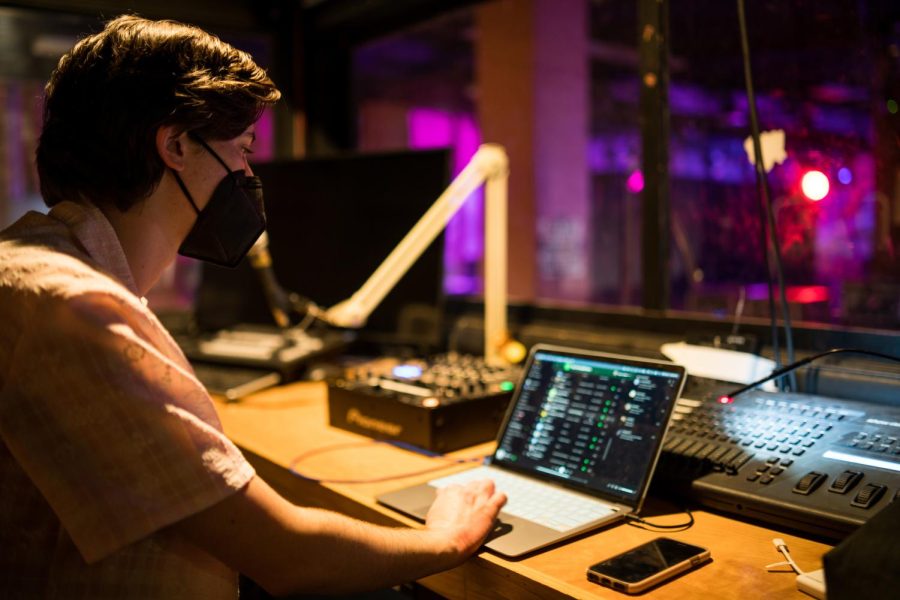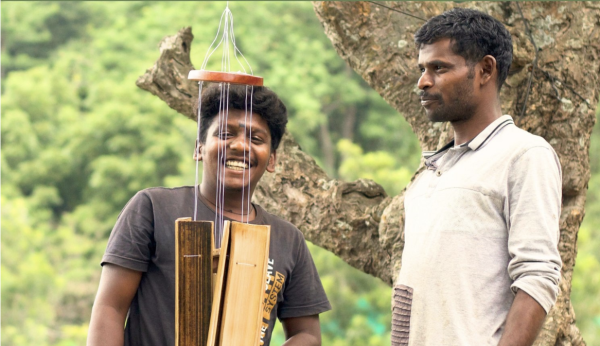Oberlin DJs Experiment, Create Atmosphere at Campus Events
Student DJs bring energy and diverse music to campus events.
At parties, in co-ops and houses, events at the Dionysus Disco, and many other gatherings, DJs at Oberlin are an unsung presence keeping the music running, sustaining the mood, and giving attendees the courage to dance. In the past year, the number of DJs has increased considerably. According to some of these DJs, the necessary skills are relatively easy to learn, and Oberlin has many people with a love of music who wish to share it with others. DJs usually work for no pay, instead drawn to take gigs as a means of participating in and contributing to the atmosphere at parties and other gatherings.
“Itʼs like curating the vibes,” Conservatory second-year and DJ Kayla Shomar-Corbett said. “Itʼs like Iʼm in charge of whether or not people like the party that they’re at … And I like that because I know I can do a good job of getting people dancing and reading the crowd. Itʼs also a lot less social pressure than having to attend a party, because I donʼt really like to talk to anyone.”
While DJing may be easy from a technical perspective, many DJs put considerable thought into what music they play at events. Each event has a different mood and audience.
“I look at what people are wearing, usually,” Shomar-Corbett said. “I feel like sometimes Iʼll look at someone and Iʼm like, ‘Oh, theyʼre on TikTok, so Iʼll play a TikTok viral song.’ But if I look at someone and theyʼre wearing something cottagecore, Iʼll be like, ‘Oh, they probably like Grimes and Phoebe Bridgers.’”
Double-degree third-year Orson Abram also felt that reading the room was important, and that adapting to different audiences was part of the fun.
“Thereʼs a lot of ability for spontaneity,” Abram said. “Iʼm a Percussion Performance major amongst other things. And [in Percussion Performance] thereʼs so much in written notation that you have to follow … that DJing just doesnʼt have. … I like working with this kind of model of playing music.”
DJs also alter the music they play. For instance, College second-year Benny Alexander makes his own music and sometimes performs sets that are entirely original. Other DJs manipulate and combine existing tracks using control systems that allow for alterations in pitch and tempo and the addition of overdubs such as drums or bass. Abram said that he often takes music he enjoys listening to and speeds it up until it becomes danceable.
“I know a lot of people kind of just have a playlist and do transitions, but thatʼs not really my style,” Shomar-Corbett said. “I like it when people donʼt realize what the song is, and then the chorus comes in and theyʼre like, ‘Oh my God!’ I think itʼs really fun.”
The music played by DJs varies greatly. Classic house tunes and popular songs that people can sing along to are frequently played, but many DJs have personal interests they want to share. Abram said the music he plays varies greatly, from house songs to ’70s African disco to J-pop. “I think for me, a big part of the lack of genre just comes from my experience growing up with the YouTube algorithm, kind of just going on hourlong searches through all this music,” Abram said.
College third-year Ava Sato said she listens to the club music coming out of Detroit, Baltimore, and New Jersey for inspiration. According to Sato, building up a music library is one of the more challenging parts of DJing. DJs must listen to hours of music in order to decide what they want to put in their sets. An hour-long set, she says, typically requires a minimum of 25 tracks.
The increase in the number of DJs at Oberlin makes it harder to find opportunities to play, but the environment is far from competitive. DJs often share gigs and perform one after another. Abram said he was excited by this trend.
“Hopefully the school starts to bring more DJs from outside of Oberlin to kind of parallel [the popularity of DJing], because itʼs a meteoric rise and Iʼm grateful thatʼs happening.”











